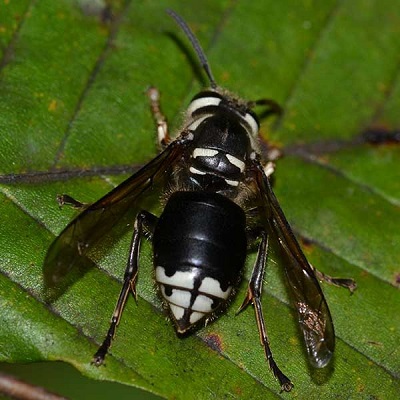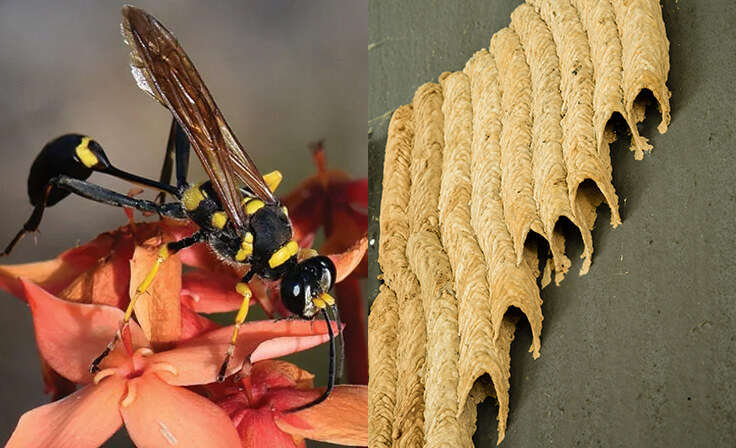



Wasp-Hornet Abatement and Prevention by The Bee Guy is a comprehensive inspection for all the structures on the property, such as your house, garage, deck and retaining walls. The treatment focuses on corners, cracks, crevices, soffits, eaves and other hot spots wasps and hornets love to nest in. Your entire property is guaranteed for the whole season until Dec. 31st after just one treatment. The guarantee is for any active nesting of any stinging insect anywhere on the property. If you find an active nest, we'll return free of charge and in a timely manner to address it.
We don't lock you into a monthly contract or long term service. You only pay us when you need us. We perform wasp and hornet treatments in May, June and July. Call us for a free phone quote for wasp and hornet abatement and prevention services so you can have a safe and enjoyable yard all summer long.
The invasive European Paper Wasp is often mistaken for a Yellowjacket. A closer look reveals it is larger than an average Yellowjacket and has a much slimmer waist. Preventing nest establishment and eliminating new nests early in the season are essential. The Bee Guy has years of experience keeping wasps and hornets out of yards and workplaces. To schedule a consultation, contact us today!
North American Paper Wasps, known as Umbrella Wasps, have a segmented body, a slow flight pattern and dangling legs. They are about 3/4" long and have a slim body. Paper Wasps prefer nesting in attics but will nest practically anywhere; in eave peaks, behind shutters, under deck railings, in gas grills, or in swing sets, mailboxes and light fixtures. Contact The Bee Guy to get rid of Paper Wasp nests on your property.

Mud Dauber Wasps are a shiny black, brown, orange and yellow color. Many have long slender thread waists. Mud Daubers place their long, tube-like mud nests in protected places like electric motors, sheds, attics, siding and porch ceilings.
Should you find mud daubers on your property, contact us!
German Yellowjackets are often mistaken for bees because they buzz like bees. They belong to a group of social wasps, cooperating to build and defend their queen and colony. Aerial Yellowjackets nest in trees or shrubs, under decks and high in eaves. Their nest is visible and easy to identify; a "football" or upside down teardrop-shaped nest constructed from gray paper with a single hole on the bottom. Yellowjackets make this paper themselves by chewing on tiny slivers of wood. The young are hatched and food is stored in the nest's center or "core" of hexagonal (or six-sided) cells. Ground Bees, a type of yellow jacket, nest in rodent burrows and build hives two inches to two feet underground. If you find any kind of Yellowjacket nest, contact The Bee Guy to take care of it!
Bald-faced hornet nests are entirely exterior, found in trees and shrubs, under decks and high in eaves. Like Arial Yellowjackets, they construct a "football" or upside-down teardrop-shaped nest from gray paper. Bald-faced hornets are aggressive when disturbed, and removal is best accomplished by a professional. Contact us today to safely remove hornet nests from your property.
| Pest | Abatement | Prevention |
|---|---|---|
| European Paper Wasp | - Seal cracks and crevices around the home to prevent nesting. - Remove nests at night when the wasps are less active. - Use a residual insecticide to kill any wasps that remain. |
- Keep trash cans tightly covered and remove trash regularly to reduce attraction to food sources. - Repair any damaged screens or holes in window and door frames to prevent entry into the home. |
| North American Paper Wasp | - Seal cracks and crevices around the home to prevent nesting. - Remove nests at night when the wasps are less active. - Use a residual insecticide to kill any wasps that remain. |
- Keep trash cans tightly covered and remove trash regularly to reduce attraction to food sources. - Repair any damaged screens or holes in window and door frames to prevent entry into the home. |
| Mud Dauber | - Seal cracks and crevices around the home to prevent nesting. - Remove nests by carefully scraping them off and disposing of them. - Use a residual insecticide to kill any wasps that remain. |
- Repair any damaged screens or holes in window and door frames to prevent entry into the home. |
| Yellow Jacket | - Seal cracks and crevices around the home to prevent nesting. - Remove nests at night when the wasps are less active. - Use a residual insecticide to kill any wasps that remain. |
- Keep trash cans tightly covered and remove trash regularly to reduce attraction to food sources. - Use yellow jacket traps to catch and kill the wasps. |
| Bald-Faced Hornet | - Seal cracks and crevices around the home to prevent nesting. - Remove nests at night when the wasps are less active. - Use a residual insecticide to kill any wasps that remain. |
- Keep trash cans tightly covered and remove trash regularly to reduce attraction to food sources. - Repair any damaged screens or holes in window and door frames to prevent entry into the home. |
If you have ever used The Bee Guy for your pest infestation, you know you’ve been given the very best service at a fair and honest price. All of our long-time customers testify to the success of our prevention and extermination services for every single one of their pest infestations. We require no monthly contract or long-term service agreement. We have 6 trucks on the road so we offer same day service in many areas. With The Bee Guy, you can’t go wrong!
If you’re now pest-free because of The Bee Guy, we’d love to hear from you! Be sure to leave us a review and tell us what you thought of our services.


